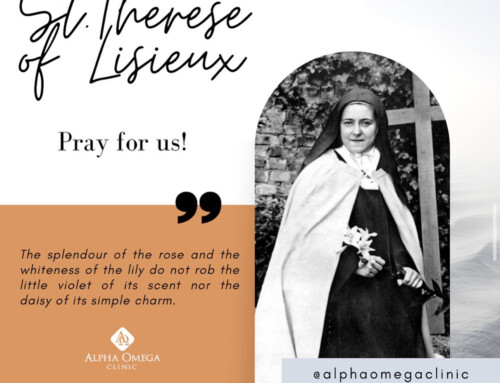This month for our Clinician Spotlight we spoke with Daniel Crandall, LPC, who brings a clear focus and well-rounded approach to Alpha Omega Clinic.
Daniel joined the clinic in 2017 and has been a great addition to our team. He has a passion for helping his clients break free of patterns that have limited them in some way. He has a special interest in men’s issues, which has helped break the stigma that is often attached to seeking therapy. His work involves a truly integrative approach to treatment, tying together neuroscience, psychotherapy, and the Catholic faith. He understands the depths of the human person and the need to make room for someone’s experience as a path towards growth and healing.
Background and Education
Daniel’s interest in the field of psychology started at a young age. During his upbringing, a member of his family was involved in a tragic accident that left them with a traumatic brain injury. This experience sparked an initial interest in biopsychology as a way to better understand what his family member had gone through. This later evolved into an interest in general psychology which resulted in Daniel’s first college degree (B.A. in Psychology).
After completing his undergraduate, Daniel served in the United States Navy. Once he finished his military commitment, he pursued graduate school and graduated in 2000 with an M.A. in Transpersonal Psychology. While attending graduate school, he heard about the Institute for Psychological Sciences (IPS), and even attended one of the early IPS conferences. This would sow the seeds for his eventual destination after a long and winding road.
After finishing graduate school, Daniel decided to step aside from the field of counseling due to life circumstances. In 2012, he made a decision to change careers and revisit his longing to become a therapist. He said this decision was sparked by a desire to immerse himself in something meaningful. Throughout the process of applying to IPS, Daniel began clarifying his vision and focus with the help of a mentor. He said that this really helped crystallize his place in the field. He knew he wanted to work with veterans, which would soon expand into a general focus on trauma. Daniel graduated in 2016 with an M.S. in Clinical Psychology from Divine Mercy University.
Throughout this journey, Daniel also went through a spiritual transformation. He grew up Lutheran and considered becoming a military chaplain while attending graduate school. Life had other plans, and he became Greek Orthodox. He described his conversion as the result of an encounter with the beauty of the Divine Liturgy. He was drawn to the works of Pope John Paul II and eventually found his home in the Catholic Church.
A Refined and Focused Treatment Approach
“We’re human beings, not human doings”
Daniel was originally drawn to working with veterans and trauma, tying together two very important parts of his life experience. He has broadened his approach to working with trauma in general, and in all forms. He has also found himself with a specific concern for men’s issues. Men, in particular, face a societal barrier to treatment, and they often delay or avoid therapy as a resource. Daniel works hard to ensure that men have a positive experience working with him to help break down this stigma.
Daniel believes it’s important to understand the process of therapy at the outset. This helps clients to better orient themselves to the work they’ll be doing. He described this by saying, “Therapy is a process of change that will take time and involve uncovering things that you may not want to uncover” and added, “It’s a process of developing new habits; a new way of being, not a way of doing. It takes work inside and outside the therapy room. The change will start to happen by the work you’re doing between sessions.”
Daniel continued to expand on the process of therapy, saying, “Your current struggles may be triggering all sorts of symptoms. While it’s important to explore the present, what is happening right now is connected to what has happened to you before.” He then said, “Talking about and exploring your family and history, while cliché, is really important. It shapes us; it’s where we learned how to be.” We know from attachment research that our neurobiology is designed to encode certain ways of viewing ourselves and others based on our relationship with primary caregivers. This creates mental models about how to move through the world and interact with others.
Daniel incorporates a solid understanding of intergenerational dynamics. He said, “This is not to blame anybody for anything. It’s not anyone’s fault; they did what they did with what they knew. It’s unfortunate that they didn’t know differently. Now, you have a chance to change these patterns and be different in your family, your work, and your community.” I found his words to be so encouraging and freeing; we do not have to be bound by our experiences and can create something new when we understand ourselves and our families.
Daniel’s background in trauma has a strong influence on his work. He said, “Triggers are not causes; the experience we had during the original causes is being pulled into the present. This is steeped in our understanding of trauma and how things get stuck or stored in the brain/body. Inevitably, our past experiences will come alive in the present if they haven’t been processed.” He then went on to describe the primary focus of trauma-informed treatment, “We want to expand your window of tolerance and increase your emotional flexibility to be better able to tolerate painful/difficult experiences.” This perspective on therapy incorporates multiple areas of research from the field of psychology to create a truly integrative approach.
As with all our clinicians, Daniel was candid about how being a therapist has impacted him. When asked, he said, “It’s been humbling being in the room with clients. Helping them to engage with this change process and seeing them change over time leaves me in awe. It’s also taught me to let go of things that may be weighing on me, particularly being ok with my own imperfections.” While interviewing him, it was clear that Daniel has found his calling. I found him to be confident, knowledgeable, focused, and humble. He has a calming presence that no doubt provides a solid foundation for the tough work his clients are doing!
Learn More or Make an Appointment
Daniel is currently accepting new clients online and in person at our Bethesda office. Learn more about him here or contact Alpha Omega Clinic if you are interested in making an appointment!




